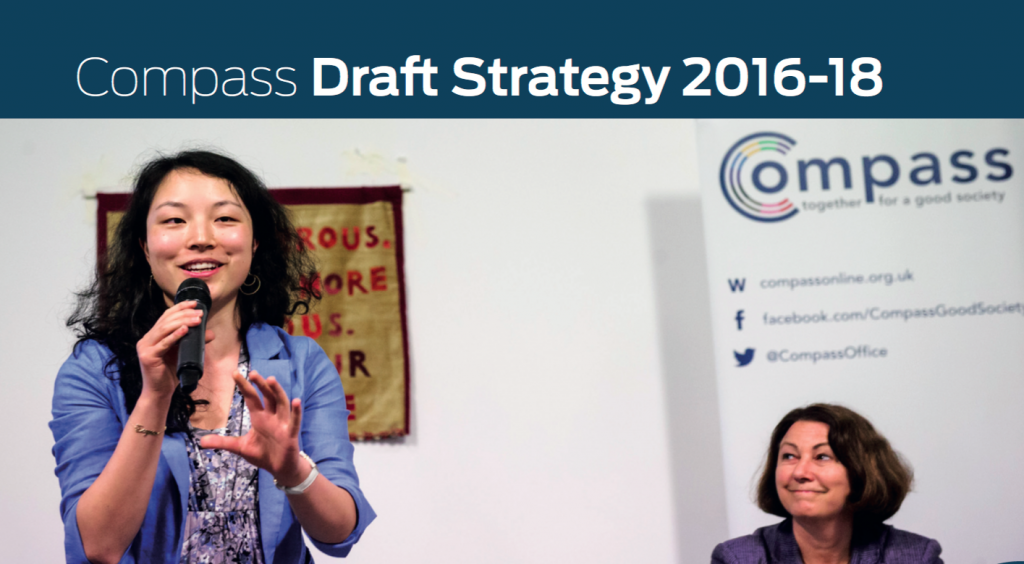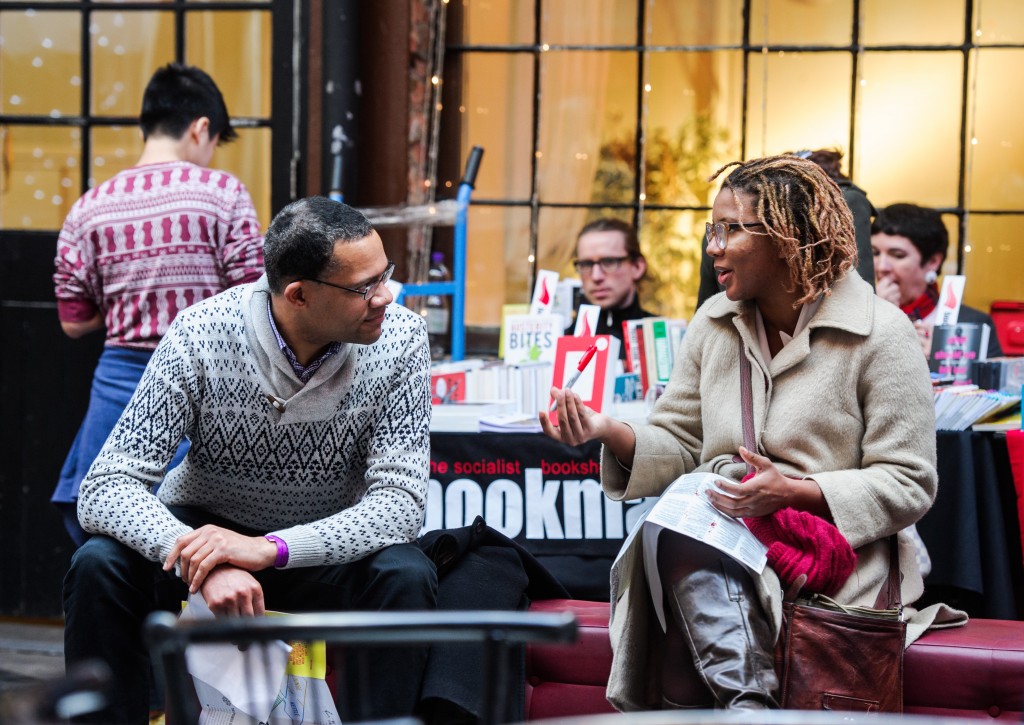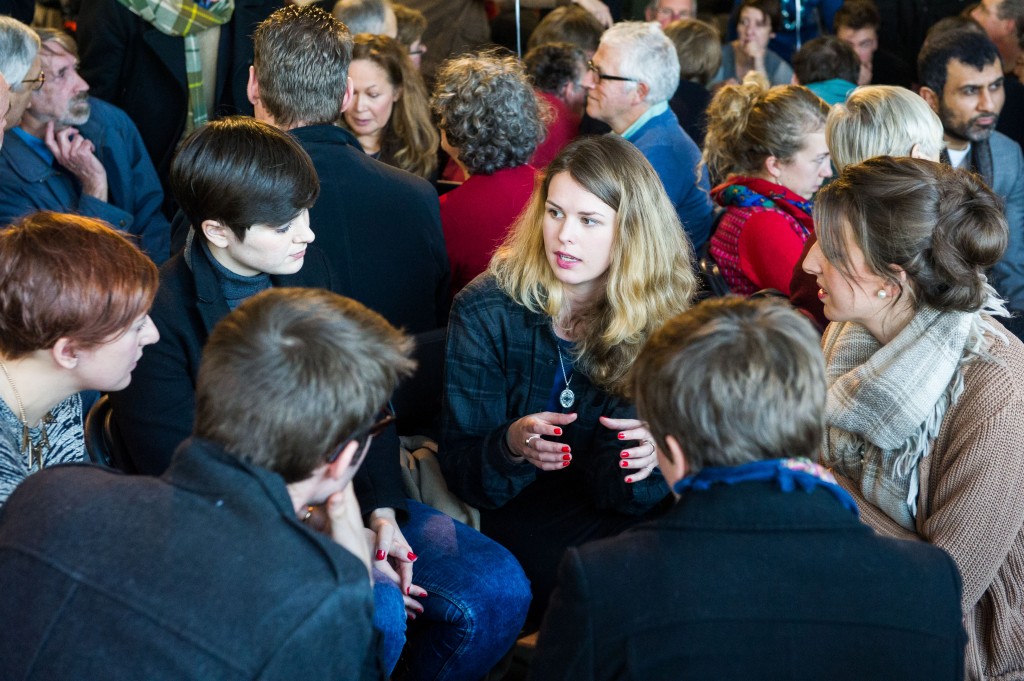
Our goal is the creation of a good society; one that is much more equal, sustainable and democratic and with that more creative, innovative, caring, loving and hopeful.
If we are really serious about this project then we must keep developing and changing and start having more impact. A er all, what is the point of having a Compass if we just stand still?
The purpose of this paper is to suggest a broad strategy for Compass and ask our members and supporters to improve it and help make it happen. It sets out the changing context we are operating in, the principles we should operate by, and the priorities we should make. Compass members will make any decisions regarding this paper after our Annual Gathering on 5th March 2016.
What is happening?
Our own experience and analysis of how the world is developing tells us that while we need to stick to our core values, we need to keep changing too.
This is the context we think we’re working in:Capitalism isn’t working for more and more people; with a growing number of precarious workers and an increasingly insecure middle class. All are threatened by at- lining wages and jobs displaced by new technologies.
- At the same time, a small elite are building the world in their narrow interest and leaving a lot of people behind.
- Capitalism without responsibility both scorches and oods the only productive base we have – our earth.
- Recurring crises, be it Britain’s exit from the EU or another nancial crash, will push us forward or further back depending on our ability and readiness to respond.
- New technologies, ideas and ways of organising politically and in our communities are building new possibilities of hope and change.
- Openness, connectivity and increasingly global perspectives make the prospects for real alternatives both more desirable and feasible.
- Old, tired and tribal forms of politics cannot meet these threats or these opportunities. Social democracy is in crisis everywhere. Labour’s new leadership offers some hope and a challenge to the political orthodoxy, but the Labour Party is not good enough or big enough on its own. The Greens are not making a break through. Reliance on change through one party, through one undemocratic state, in one country, is simply hopeless.

We need to make much more happen: we can and will. Compass is a key part of this, but we are certainly not alone. Change is happening as a consequence of the referendum movement in Scotland and in the nations, regions and cities of our country. We are learning so much from what is happening in other places: from Podemos in Spain and citizen’s platforms in Barcelona and Madrid, from the Alternativet Party in Denmark and from the progressive government in Ecuador. We are learning from the possibilities of peer-to-peer economies, the myriad online experiments in democracy and the owering of civil society groups and new commons movements (in Ghent, Toulouse, Melbourne, Bologna etc.). These are all emerging precisely because the old ways of doing politics aren’t working.
The political challenge is how to scale up and join up all these movements for change to create a symphony for a good society out of cacophony.
So, what is to be done – and how?
A more rigorous, ambitious, desirable and feasible approach must be based on a set of operating principles. These are ours:
- The second principle is to focus on alternatives and spend less time on defense. Protecting the NHS, campaigning against TTIP or austerity are essential and Compass will support these struggles where we can. But we will eventually collapse if we are only running up the down escalator. The challenge for Compass is to change the terms of debate and build real, coherent and viable alternatives. This understanding has led us to work, for instance, on the transformative idea of a citizen’s income, and should include a shorter working week and new forms of economic ownership and control.On the economy and rethinking the state, minor reforms will no longer do. We need to re-make social and economic institutions in ways that enable us to be fully human. We need to be more explicit about this, and make tangible what we mean by a good society and a good life. And we will.
- The first principle is to be long term and systemic. We need to develop and put into practice a theory of transformation. The early work around this takes form in The Osborne Supremacy and we will build on this through a 21st Century Hegemony Project that includes an accessible paper on our theory of transformation. This will help us frame debates and develop popular narratives. It also allows us to understand the social building blocks and agency necessary to build a transformative political project. It will help us to understand the nature of political leadership in the 21st century. The need for systemic and long-term change is not a national challenge, but a global one. The same opportunities and threats are being presented in different places across the world. There can be no good society in one country.
- The third principle is to work with those who want systemic change too and struggle less with people who ‘just’ want to try and tame the existing system. Those seeking systemic change include politicians from all progressive parties, including the Women’s Equality Party, as well as organisations like openDemocracy, NEON, Red Pepper, Soundings, NEF, Common Weal, PIRC, Real Economy Lab, Finance Lab, ShareAction, Philosophy Football, Rethinking Economics, Momentum, CLES, technologists, Smart CSOs, P2P Foundation and other European networks and global partners. Our unique task is to work out how to join up and scale up activity in an ecosystem of organisations that want systems change.
- The fourth principle is to try to work more in real time, around real events and not just in the abstract. This is one of the lessons of the Scottish referendum, which took a vote on independence and turned it into a debate about what sort of country the people wanted it to become. Extraordinary energy and vitality were unleashed. This is the basis for our Good Europe and Good London projects – strategically using elections and referendums to build visions, programs and networks for change. In addition, we hope to develop a project around democratic transformation, allied to the establishment of a constitutional convention.
- The fifth principle is to help build bridges between more horizontal social movements and civil society and more vertical party politics. We call it ‘45 degrees politics’ – the point at which the vertical and the horizontal meet. Westminster still matters. That is why we are working within progressive parties to help improve them and to build a Progressive Alliance across them – not least to try and secure the key strategic goal of a proportional voting system after 2020. We are also re-imaging what the party of the 21st century looks and feels like.
- The sixth principle is that we need to actively challenge systems of oppression as an organisation and as a society. We cannot hope to make meaningful change happen if we are not challenging systemic, structural and historical hierarchies based on gender, sexuality, race, class, ethnicity, (dis)ability, age and any other identities.
Sustainability must run through the heart of everything we do and cannot be a separate project.
Starting in 2016, we want to start pulling all this work together into a coherent and convincing narrative and structure for change. This includes the vision, policies, agency and ecosystems of media, ideas, activism, campaigns, politics and popular language necessary – not just in the UK but throughout European and global networks. We need to be building the foundations to make the desirable ever more feasible.
Our practice will aim to be curious, courageous, collaborative, generous, open, hopeful, loving and inspiring.
So how do we do all that with just three people in an office? We have to leverage, network and collaborate to make a sum bigger than our parts. Our new Associates initiative is just the start of this.
Some of the biggest challenges for Compass are clear:
- To translate and communicate our thinking in more accessible, popular and effective ways
- To involve our members and stakeholders in decisions and projects
- To diversify our funding base through many more small, regular donations
- To bolster both local groups and international networks
- To act as a hub for progressives to help form an ecology or
campsite for a good society - To build the spaces, practices and platforms to allow 45 Degree Politics to take shape and create the change we wish to see in the world
Compass is more than a think tank; we are a hub, a home and a network.
We are certain in our values but fluid in our approach, and we are always learning and developing. We are more determined than ever to make real progress towards a good society. We are patiently and purposefully building our collective power, looking at long-term cultural and political shi s, not just electoral cycles. Change is coming
– we have to prepare now to bend it to a good society.
Some questions you might want to respond to:
- Is this shift from immediate concerns to more structural change right?
- Are we proposing to do it in the right way?
- Are we proposing to do it around the right issues?
- Who else should we be working with?
- What can you do to help?

